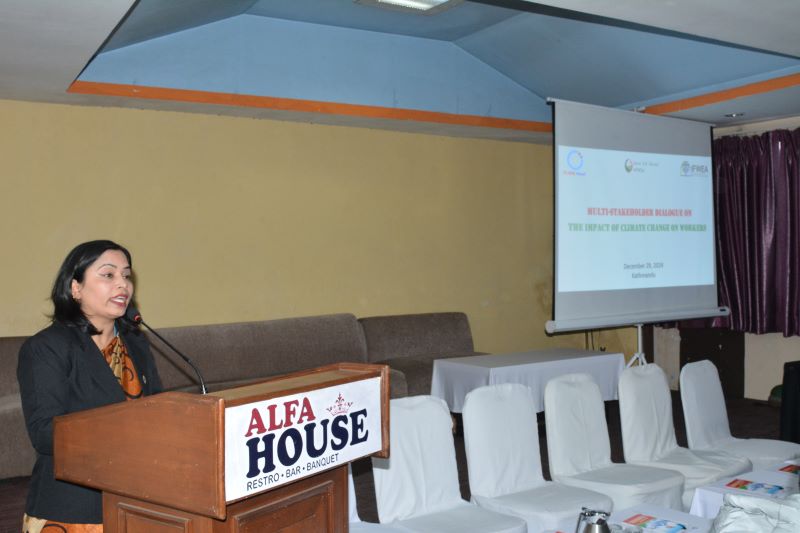Climate change affects working, communities, labour markets

Kathmandu. Various stakeholders have emphasised the direct impact of climate change on the working community and the labour market.
Speaking at the programme of Multi-Stakeholder Dialogue on Climate Change Impact on Workers, organszed jointly by CLASS Nepal, Union Aid Abroad-APHEDA, and the International Federation of Workers’ Education Associations (IFWEA) in Kathmandu on Sunday, they discussed how climate change significantly affects the working community and the labour market, creating both challenges and opportunities across various sectors.
As global temperatures rise, extreme weather events become more frequent, and ecosystems face disruptions, the labour market is affected in several ways, including job losses in certain industries, shifts in skill demands, and the emergence of new job sectors. These changes require immediate action from various stakeholders like governments, businesses, and labour unions to mitigate risks and capitalize on emerging opportunities, they suggested.
Workers in sectors highly vulnerable to climate change, such as agriculture, construction, and fossil fuel industries, may experience job losses or reduced incomes due to changing environmental conditions. Programms should be introduced to ensure a just transition for these workers by providing retraining, reskilling, and alternative employment opportunities, they emphases.
Presenting a working paper on the effects of climate change, Nabaraj Pudasaini, Joint Secretary at the Ministry of Forest and Environment, said that rising temperatures would reduce workers’ capacity to work, limit available working hours, and negatively impact their health due to an increase in new diseases.
He also pointed out that workers in the informal sector suffer the most from natural disasters, such as landslides, particularly those living in low-income areas near riverbanks and forests.
Pradeep Kumar Koirala, Joint Secretary at the Ministry of Labour, Employment and Social Security (MoLESS), said that while there has been significant discussion about the impacts of climate change, no alternative plans have been developed to address its effects on the labor market and workers.
Shilshila Acharya, an environmental researcher, said that both employers and the government have been silent on providing jobs for workers displaced by changes in the labour sector, caused by the positive or negative effects of climate change and new technologies.
Yogendra Kunwar, President of the Joint Trade Union Coordination Centre (JTUCC), said that women workers in the informal sector would be disproportionately affected, as climate change impacts all the sectors, including agriculture.
He called for the informal sector to receive the support being claimed by Nepal, a country that contributes little to global carbon emission, through social security and health programmes.
He said that the government should increase investment in human development as well, not only focus on physical development.












 यी हुन कांग्रेसको संस्थापन समूह र विशेष महाधिवेशन समूहबीच वार्तामा नमिलेका विषय
यी हुन कांग्रेसको संस्थापन समूह र विशेष महाधिवेशन समूहबीच वार्तामा नमिलेका विषय विश्वकप तयारीका लागि नेपाली क्रिकेट टोली श्रीलङ्का र भारत जाने
विश्वकप तयारीका लागि नेपाली क्रिकेट टोली श्रीलङ्का र भारत जाने गायक तथा अभिनेता प्रशान्त तामाङको निधन
गायक तथा अभिनेता प्रशान्त तामाङको निधन कांग्रेस विशेष महाधिवेशन सुरु
कांग्रेस विशेष महाधिवेशन सुरु आज २०८२ साल पुस २७ गते आइतबारको राशिफल
आज २०८२ साल पुस २७ गते आइतबारको राशिफल कांग्रेस फुट्न दिँदैनाैं, आवेग हाेइन विवेकले निर्णय गरेर सिंगो पार्टीको नेतृत्व गर्छौं : विश्वप्रकाश शर्मा
कांग्रेस फुट्न दिँदैनाैं, आवेग हाेइन विवेकले निर्णय गरेर सिंगो पार्टीको नेतृत्व गर्छौं : विश्वप्रकाश शर्मा आज पुस २८ गते सोमबारको राशिफल, कस्ताे रहला तपाइकाे आजकाे दिन ?
आज पुस २८ गते सोमबारको राशिफल, कस्ताे रहला तपाइकाे आजकाे दिन ?
प्रतिक्रिया